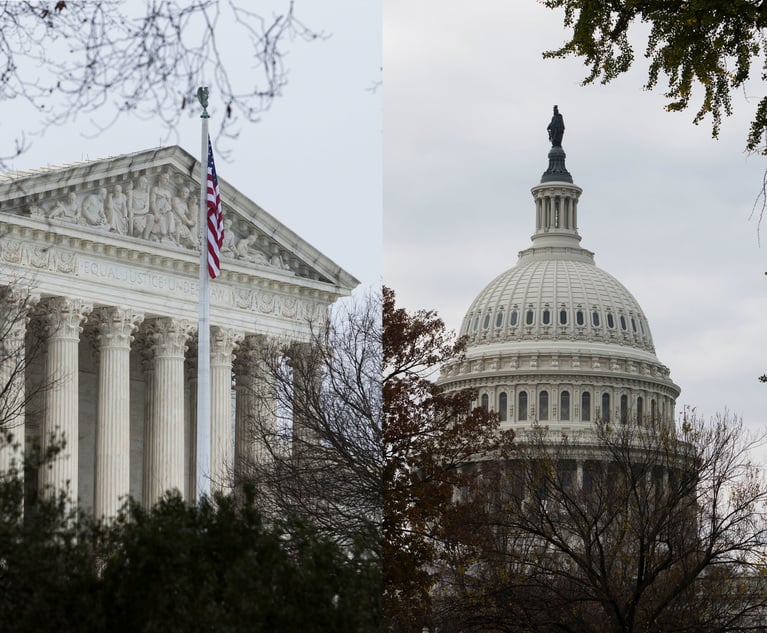 Salesman John Licata demonstrates a competition shooting gun at SP firearms on Thursday, June 23, 2022, in Hempstead, New York. Photo: Brittainy Newman/AP
Salesman John Licata demonstrates a competition shooting gun at SP firearms on Thursday, June 23, 2022, in Hempstead, New York. Photo: Brittainy Newman/AP Strict and Constitutional Gun Regulation for New York
If police in New York may no longer ask gun license applicants why they want to carry a gun, it becomes more important than ever to have strict and enforceable laws concerning who, where, when and how a concealed firearm may be carried in a public place.
October 13, 2022 at 10:30 AM
14 minute read
The U.S. Supreme Court's decision on gun carrying rights, NYS Rifle and Pistol Assoc v. Bruen, has obliged Albany to make major revisions to New York's venerable licensing law for carrying concealed firearms in public places. The court in Bruen invalidated a pivotal provision in the 1913 Sullivan Act which limited availability of "concealed carry" licenses to applicants who had "proper cause," or a special reason to carry a gun. PL 400.00(2)(f). "Proper cause" was not defined in the Penal Law, but was judicially interpreted to mean "a special need for self-protection distinguishable from that of the general community or of persons engaged in the same profession." Klenosky v. NYC Police Dept., 75 A.D.2d 793 (1st Dept. 1981; aff'd 53 N.Y.2d 685 (1981); upheld in Kachalsky v County of Westchester, 701 F.3d 81 (2d Cir 2012).
With the elimination of the "proper cause" requirement, gun licensing authorities will no longer be asking applicants why it is necessary for them to carry a gun in public places for self-protection. The "Letter of Necessity" that has confined gun carrying to a select group for over a century has been abolished. Because local licensing officials can no longer vet applicants by eliciting their reason for carrying a gun, New York is obliged to enact clearer, stricter and more effective laws concerning who, where, when and how a concealed firearm is to be carried in a public place. The New York legislature has responded with a regulatory scheme that, despite some lingering constitutional problems, accomplishes this important objective to a considerable extent. Most of the new law took effect Sept. 1, 2022.
This content has been archived. It is available through our partners, LexisNexis® and Bloomberg Law.
To view this content, please continue to their sites.
Not a Lexis Subscriber?
Subscribe Now
Not a Bloomberg Law Subscriber?
Subscribe Now
NOT FOR REPRINT
© 2025 ALM Global, LLC, All Rights Reserved. Request academic re-use from www.copyright.com. All other uses, submit a request to [email protected]. For more information visit Asset & Logo Licensing.
You Might Like
View All
22-Count Indictment Is Just the Start of SCOTUSBlog Atty's Legal Problems, Experts Say
5 minute read
Roberts Calls Court's Relationship With Congress 'Strained.' Who's to Blame?
Trending Stories
Who Got The Work
J. Brugh Lower of Gibbons has entered an appearance for industrial equipment supplier Devco Corporation in a pending trademark infringement lawsuit. The suit, accusing the defendant of selling knock-off Graco products, was filed Dec. 18 in New Jersey District Court by Rivkin Radler on behalf of Graco Inc. and Graco Minnesota. The case, assigned to U.S. District Judge Zahid N. Quraishi, is 3:24-cv-11294, Graco Inc. et al v. Devco Corporation.
Who Got The Work
Rebecca Maller-Stein and Kent A. Yalowitz of Arnold & Porter Kaye Scholer have entered their appearances for Hanaco Venture Capital and its executives, Lior Prosor and David Frankel, in a pending securities lawsuit. The action, filed on Dec. 24 in New York Southern District Court by Zell, Aron & Co. on behalf of Goldeneye Advisors, accuses the defendants of negligently and fraudulently managing the plaintiff's $1 million investment. The case, assigned to U.S. District Judge Vernon S. Broderick, is 1:24-cv-09918, Goldeneye Advisors, LLC v. Hanaco Venture Capital, Ltd. et al.
Who Got The Work
Attorneys from A&O Shearman has stepped in as defense counsel for Toronto-Dominion Bank and other defendants in a pending securities class action. The suit, filed Dec. 11 in New York Southern District Court by Bleichmar Fonti & Auld, accuses the defendants of concealing the bank's 'pervasive' deficiencies in regards to its compliance with the Bank Secrecy Act and the quality of its anti-money laundering controls. The case, assigned to U.S. District Judge Arun Subramanian, is 1:24-cv-09445, Gonzalez v. The Toronto-Dominion Bank et al.
Who Got The Work
Crown Castle International, a Pennsylvania company providing shared communications infrastructure, has turned to Luke D. Wolf of Gordon Rees Scully Mansukhani to fend off a pending breach-of-contract lawsuit. The court action, filed Nov. 25 in Michigan Eastern District Court by Hooper Hathaway PC on behalf of The Town Residences LLC, accuses Crown Castle of failing to transfer approximately $30,000 in utility payments from T-Mobile in breach of a roof-top lease and assignment agreement. The case, assigned to U.S. District Judge Susan K. Declercq, is 2:24-cv-13131, The Town Residences LLC v. T-Mobile US, Inc. et al.
Who Got The Work
Wilfred P. Coronato and Daniel M. Schwartz of McCarter & English have stepped in as defense counsel to Electrolux Home Products Inc. in a pending product liability lawsuit. The court action, filed Nov. 26 in New York Eastern District Court by Poulos Lopiccolo PC and Nagel Rice LLP on behalf of David Stern, alleges that the defendant's refrigerators’ drawers and shelving repeatedly break and fall apart within months after purchase. The case, assigned to U.S. District Judge Joan M. Azrack, is 2:24-cv-08204, Stern v. Electrolux Home Products, Inc.
Featured Firms
Law Offices of Gary Martin Hays & Associates, P.C.
(470) 294-1674
Law Offices of Mark E. Salomone
(857) 444-6468
Smith & Hassler
(713) 739-1250








